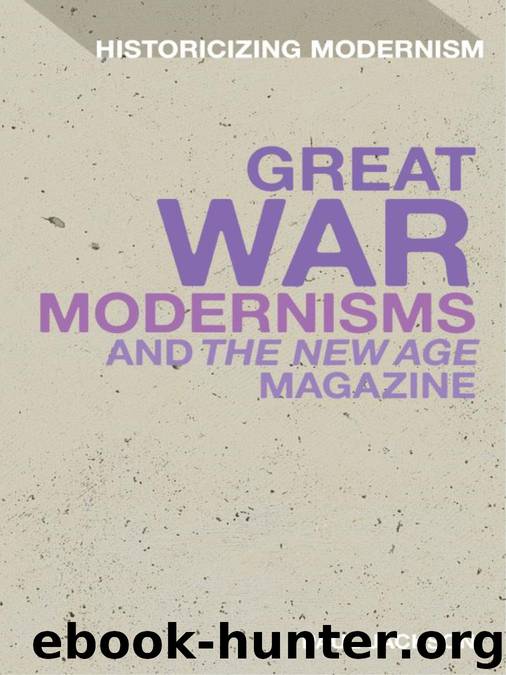Great War Modernisms and 'The New Age' Magazine by Jackson Paul;

Author:Jackson, Paul;
Language: eng
Format: epub
ISBN: 9781441138026
Publisher: Bloomsbury UK
Published: 2019-11-22T16:00:00+00:00
5
Wyndham Lewis and modernist
aesthetics in wartime
From the fiction that he began publishing in 1909 to his editing of Blast in 1914, Wyndham Lewis was a figure whose star rose quickly ahead of the war. By the outbreak of the conflict, he occupied a prominent position in British modernist circles and his work offered original perspectives. His new aesthetic, Vorticism, was itself a visually distinct response to modernity when compared to its nearest equivalents, Futurism and Cubism. Moreover, we can see in the prewar Lewis a clear concern to examine the unsettling conditions of modernity, and render these into discrete, new aesthetic forms. So already within this matrix one can detect the core aesthetic modernist trait of confronting a decadent modernity through radical artistic innovation. Before 1914, and ever more so during the war, we also see in Lewis’s work the emergence of coded, political modernist messages underpinning calls for a new and revitalized form of civilization, ideas that in the 1930s would eventually drew Lewis to fascism. Indeed, regarding Lewis’s politics, Alan Munton’s description of his political trajectory as ‘left-right-left’ offers an overview of the political stances taken by Lewis, with these particularly right-wing interests, discussed at the end of this chapter, developing in the interwar period.1 Though he never rendered his critique of Western modernity into a concrete, revolutionary ideology, such as guild socialism, during the wartime era we will see that Lewis increasingly sought not only to critically engage with the political impact of modernity on intellectual and social life in his work, but also to promote an engaged role for the radical artist to change society. As such, Lewis can be seen as more than an aesthetic innovator, and, as with the intellectuals already encountered, by the end of the war he too called for a new epoch to emerge from the senseless trauma of European conflict. Only by giving a voice to a new epoch through continued aesthetic innovation could the experiences of warfare be transcended.
As such, Lewis offers a clear example of an aesthetic modernist, yet one possessing some clearly political modernist tendencies too. Indeed, we can understand this characterization more fully by looking at the development of Lewis’s thinking ahead of the war. In order to explore Lewis’s volatile modernism, this chapter will begin with an examination of his prewar ideas, assessing some of his earliest published writings before focusing on the critique of modernity that he developed during his Vorticist period, epitomized by his writings for his journal, Blast. Here we find many of the modernist tendencies that made Lewis stand out as a key figure among radical intellectuals by 1914. The analysis will then survey the impact of the war on his continued ability to promote Vorticism, as well as on his first published novel, Tarr, initially serialized in the Egoist. Lewis’s period as an official war artist will also be considered, revealing again his complex responses to modernity and warfare, especially as it rendered the absurdity of individual human experience in the face of an industrialized war machine.
Download
This site does not store any files on its server. We only index and link to content provided by other sites. Please contact the content providers to delete copyright contents if any and email us, we'll remove relevant links or contents immediately.
Still Me by Jojo Moyes(10812)
On the Yard (New York Review Books Classics) by Braly Malcolm(5396)
Eleanor Oliphant Is Completely Fine by Gail Honeyman(5088)
A Year in the Merde by Stephen Clarke(5082)
The Bookshop by Penelope Fitzgerald(3627)
Surprise Me by Kinsella Sophie(2994)
How Music Works by David Byrne(2969)
Pharaoh by Wilbur Smith(2883)
Why I Write by George Orwell(2782)
A Column of Fire by Ken Follett(2494)
The Beach by Alex Garland(2432)
The Songlines by Bruce Chatwin(2415)
Churchill by Paul Johnson(2374)
Aubrey–Maturin 02 - [1803-04] - Post Captain by Patrick O'Brian(2216)
Heartless by Mary Balogh(2174)
Elizabeth by Philippa Jones(2082)
Hitler by Ian Kershaw(2053)
Harry Potter and the Cursed Child by J. K. Rowling & John Tiffany & Jack Thorne(1976)
The Patrick Melrose Novels by Edward St. Aubyn(1910)
